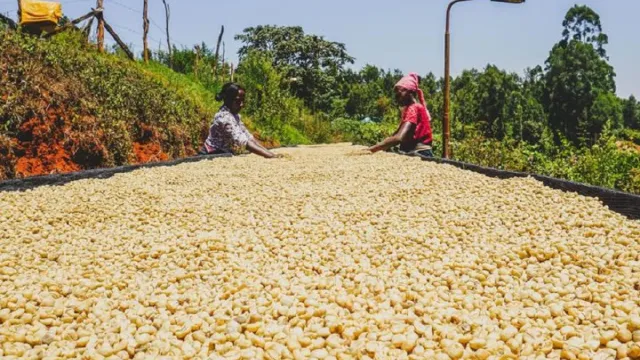Kenyan coffee stirs global markets yet farmers' earnings keep falling

Kenyan coffee stirs global markets yet farmers' earnings keep falling
Kenya’s coffee exports have improved in the recent past yet farmers continue to suffer from poor returns, latest data from the ministry of Agriculture shows.
Speaking while launching the Coffee Report 2021, Agriculture Cabinet Secretary Peter Munya, noted that Kenyas Arabica coffee-the variety grown in Kenya-has continued attracting buyers from key export markets globally.
Mr Munya told reporters that the good tidings in the sector has been powered by the ongoing reforms.
He noted that in the 2019-2020 coffee year, the country exported 46,333 metric tonnes of green bean equivalent that earned Kes 22 billion (about USD$ 209.82 million) representing a 285 per cent jump in coffee export earnings from Kes 5.7 billion realised in 2003-2004.
But the CS noted that despite the crop fetching top dollar in the market, the payments to coffee farmers per kilogram of cherry have continued to decline.
Read also: Five firms get CMA nod to steer coffee brokerage services
“We are reforming the subsector by improving efficiency, performance and earnings to farmers as well as increase international sales of the commodity,” said Mr Munya.
Coffee is currently grown on approximately 120,000 hectares spread across 33 counties supporting over 800,000 households and over 5 million citizens directly and indirectly.
Although over 70 per cent of the crop has historically been grown around the Mt Kenya counties of Kiambu, Murang’a, Nyeri, Kirinyaga, Embu, Tharaka Nithi and Meru, there are significant promises in the new coffee growing frontiers of Rift Valley, Western Kenya and Nyanza.
He said that marketing agents that have been doubling up as some coffee buyers will be outlawed in the trade through the Coffee Bill 2021 that is undergoing public participation at the National Assembly.
“I urge all coffee farmers to mobilize their members of Parliament to support the Bill,” said Mr Munya added.
Further, he noted that farmers will henceforth be given discretion in the processing, trading, sale and payments for their coffee beans.
The acreage under coffee production has decreased by over 30 per cent to about 119,000 hectares currently from roughly 170,000 hectares in early 1990s, coffee production has decreased by a whopping 70 per cent to about 40,000 metric tons currently from a peak of 129,000 metric tons in 1983/84 coffee year.
The 1960s, 1970s and 1980s are considered the golden years of Kenya’s coffee industry. At independence, the area under coffee production was approximately 45,438 hectares while coffee production was about 44,778 metric tons per annum.
However, area under coffee production increased steadily after independence following easing of restrictions hitherto imposed by the colonial administration to reach an all-time high of 170,000 hectares in early 1990s while coffee production rose to 129,637 metric tons in 1988/99 coffee year.



